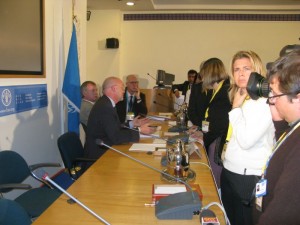
Financial Times | November 18 2009
By Javier Blas in Rome
The United Nations has started drawing up a code of conduct to regulate overseas investment in farmland, but the voluntary rules will not be ready for at least a year.
The code is the first attempt to control the growing trend of so-called “farmland grab” deals, which involve rich countries such as Saudi Arabia and South Korea investing in overseas farming to boost their own food security.
The trend gained prominence after an attempt by South Korea’s Daewoo Logistics to secure a large chunk of land in Madagascar contributed to the collapse of the African country’s government.
Diplomats are concerned that African countries, many of which face problems of chronic hunger, are giving away vast tracts of farmland almost for free in return for vague promises of job creation and spending on infrastructure.
The UN and the World Bank are walking a tightrope in drawing up a code of conduct, however, as they do not want to undermine all foreign direct investment in agriculture, which they believe can offer opportunities for development.
The difficulty was reflected in a declaration from the World Food Summit in Rome that aims to “facilitate and sustain private investment in agriculture” while seeking a study of “good practices to promote responsible international agricultural investment”.
Guidelines would be non-binding, UN officials said. They would focus on making sure that “existing rights to land?...are recognised” and “investments do not jeopardise food security”, according to a World Bank draft policy paper seen by the Financial Times.
The code will also call for transparency in the process of “accessing land and making associated investments” and asks that “all those materially affected are consulted”. It also deals with guarantees about a project’s economic viability, social impact and environmental consequences.
David Hallam, deputy director of trade and markets at the UN’s Food and Agriculture Organisation in Rome, who is leading the work, said the aim was to transform “malpractices” into “win-win” scenarios for investors and hosts.
“It appears that there is political support for voluntary guidelines,” he said, adding that such a code was unlikely to be ready until late next year.
UN officials acknowledged that the delay could give investors time to secure farmland rights before the code of conduct came into force, but said discussion of the guidelines was already prompting a change in investors’ attitudes.
Campaigners protesting against the farmland deals complain that the code of conduct will not resolve the problem, arrive too late and lack teeth.
Devlin Kuyek of Grain, a non-governmental organisation that monitors farmland deals, said: “Win-win on land grabbing is a nonsense.”












